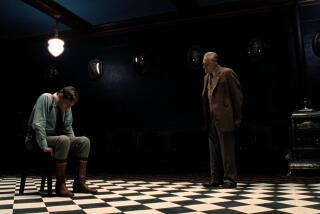All the Writing Here Was Re-Rewriting
- Share via
Adapting a novel for the screen involves a lot more than just carefully selecting the best scenes and characters from a book. “You don’t write an adaptation by editing down a book,” says veteran screenwriter Ron Bass, who did the original adaptation of David Guterson’s best-selling novel “Snow Falling on Cedars.”
“I approached ‘Snow Falling’ as if I were writing an original script,” Bass recalls. “You have to find a way to get inside the material, to feel the emotions the people felt. But you’re creating a whole new story for a new medium, except that you get to steal a lot of material from the novel.”
Of course, movies tell stories through images, not just through dialogue. So it didn’t come as a big surprise to Bass, who’d previously adapted several novels, including “Waiting to Exhale” and “The Joy Luck Club,” that director Scott Hicks rewrote much of his script before he shot the Universal Pictures film, which opens Dec. 22.
“Scott’s version was very different,” Bass says. “It was easily 50 pages shorter than my draft. I think Scott felt there was too much going on, that I was trying to tell too many stories.”
The plot centers on the trial of a Japanese fisherman accused of murdering a fellow fisherman from their small island’s Scandinavian community. The trial that ensues uncovers tensions and long-buried racial divisions stretching back to World War II and the Japanese internment camps, as well as personal wounds, especially the unresolved secret childhood romance between the defendant’s wife Hatsue (played by Youki Kudoh) and local journalist Ishmael Chambers (Ethan Hawke), who is covering the trial.
“Snow Falling” presented particular difficulties for its screen adapters. The story is filled with flashbacks and told by numerous characters--in fact, some of the same flashbacks are presented through different points of view. Both Bass’ and Hicks’ screenplays preserved this approach, making “Snow Falling on Cedars” an unusually multilayered film, one that jumps frequently in time and perspective.
Although Bass shares screenplay credit with Hicks, many of Bass’ choices in telling the story did not make it to the screen. “Scott took out my voice-overs, he even rewrote my prose descriptive passages,” he says. “For me, this was a story about how the things that happen to us in the past change who we are and determine the actions we take in the world. But for Scott, the real story of the movie was the love story. So in the movie now, many of the trial scenes have disappeared or given way to flashbacks about Ishmael’s past. It’s very much the story of Ishmael’s journey--how he tries to make sense out of his life and set himself free.”
Bass isn’t complaining--he says he’s been very moved each time he’s seen the film. “Scott’s film is more poetic and impressionistic, less literal and direct,” says Bass, who did two rewrites with Hicks before the director rewrote the script on his own.
One of the most poignant moments in the novel comes when Ishmael visits his widowed mother Helen and confesses his unhappiness. Ishmael has taken over his father’s newspaper but feels he hasn’t lived up to his father’s legacy. Hicks realized that the mother-son scene was one of the few places in the script where the laconic Ishmael could articulate his emotions. It also was an apt spot to see how much sway the memory of his father had, both for Ishmael and his mother.
“It helped bring the subtext to the surface,” Hicks says. “Ishmael’s dilemma is about doing the right thing. But we see how much of a role his father’s presence plays in his decision. You see how conflicted Ishmael is. He’s dragging his heels, yet we see that he knows what his father would have done in this situation.”
*
In his rewrite of the script, Hicks interrupts the scene with a flashback of Ishmael’s father’s funeral, at which Japanese mourners tell the family how much they respected his compassion and fairness. While editing the film, Hicks essentially rewrote the scene again by reorganizing where the two halves appear in the film. They are now totally separate: The first portion of the scene occurs half an hour earlier in the movie. (In the novel, Ishmael’s visit with his mother is told all in one scene.)
What follows is the second half of the scene, which takes place, as much of the present-day part of the story does, during a snowstorm. Ishmael is again visiting his mother. He’s been moodily poking around in his late father’s study. Taking down a bound volume of his father’s newspaper--the newspaper Ishmael now runs--he finds a photograph of his secret childhood love, Hatsue, the day she was crowned as the island’s strawberry princess. It is Hatsue’s husband who is on trial for murder, and Ishmael is trying to decide whether to reveal some information he has that might set her husband free.
INTERIOR. CHAMBERS’ HOME. NIGHT
Ishmael turns to see Helen watching him in the doorway, still wearing her coat and scarf.
HELEN
“You should stay the night. Don’t drive back through this.”
ISHMAEL
“I’ve got an early start.”
A pause. Ishmael goes to shut the bound newspaper volume, but not before Helen’s eye takes in the picture of Hatsue.
A moment. Then . . .
HELEN
“This room is full of ghosts, isn’t it?”
No response. Ishmael turns away to replace the book in its vacant slot.
HELEN
“I hate to see you this way. . . .”
Ishmael’s back remains resolutely turned.
ISHMAEL
“I don’t know what you’re talking about.”
HELEN
“I’m right, aren’t I? About your feelings for her?”
Ishmael’s silence speaks volumes.
HELEN
“She’s married, Ishmael.”
No response.
HELEN
“Look, it’s awfully cold in here. Let’s talk in the kitchen.”
ISHMAEL
“I don’t want to talk about anything.”
HELEN
“You’re just like your father. He never . . .”
Ishmael spins around, his face seething with emotion.
ISHMAEL
“I’m not just like my father. I know everyone wishes I was. Every time they look at me, I can see them thinking, ‘He’s only half the man his father was.’ And they’re right.”
Helen looks him in the eye. And, gently . . .
HELEN
“I was only going to say he didn’t mind the cold.”
Ishmael looks away. She moves closer. She hugs him quickly.
HELEN
“It’s not such a terrible thing. To be your father’s son.”
More to Read
Only good movies
Get the Indie Focus newsletter, Mark Olsen's weekly guide to the world of cinema.
You may occasionally receive promotional content from the Los Angeles Times.









